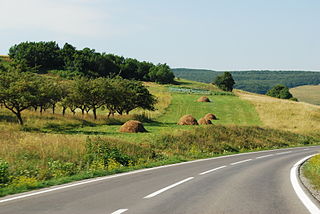
After more than 15 years living and working in Eastern Europe, the former USSR and the Middle East. Stuart Meikle returned westwards. A sabbatical followed to re-orientate himself back to North West European agriculture, food and policy issues. After the Brexit referendum, the possibilities of a UK-only policy was too interesting to pass on. A period of convalescence then allowed him the time to bring his ideas together and to write them up, thus this UK agri-food policy paper. It is an attempt to address the many relevant but complex issues at the same time. The paper was written before his soils-first policy paper published in ARC2020 (pdf) and it is best considered within the context of evolutionary thinking that is seeking to find definitive policy solutions.
Here we present chapter one of 13 by Stuart Meikle.
Creating a British Farming, Food and Rural Policy
The Common Agricultural Policy has absorbed the greater part of the European Union’s budget since the United Kingdom joined in 1973. It has had a massive influence on British agriculture for nearly 50 years. No other industry will have been so greatly impacted by the United Kingdom’s EU membership, and no other industry will be as affected as Britain leaves the European Union. The CAP has become cumbersome, and leaving the EU now offers the UK the opportunity to create a new food and farming policy.
Fortuitously, Britain’s departure comes at a time when food production is entering an era that must see unprecedented change. The majority are now aware that climate change and global warming must be addressed; not least within a food system that emits greenhouse gases. There is also the rising awareness that food-related illness will place the greatest ever burden on the National Health Service for several decades to come. Less well known is the threat to food security that is emanating from the declining efficacy, in the face of building resistance, of our science-derived, food-production solutions.
Britain’s EU membership has coincided with the chemistry-led agricultural revolution of the late 20th Century. The revolution has resulted in unprecedented increases in yield, be it from plants or farmed animals. At its start, the driver was to increase food supply post-1945. At its end, there is little concern for food availability, only accessibility. Its legacy is, however, concerns over the nutritious value of the food that it produces, soil health and fertility, efficacy decline and resistance to its ‘solutions’, animal welfare and the GHG emissions from some of its methods. The revolution must now turn full circle.
Creating a British food, farming and rural policy offers the chance to build a resilient food production system that works with nature and not against it. It offers the chance to rectify the damage that has happened from exploitive farming methods and to move away from systems that are overly reliant on human-made solutions. They are not sustainable. They also came with many negatives relating to, for instance, soil carbon and humus loss and pollinator, flora and fauna decline. All must now be reversed.
In recent decades farming and food has been of diminishing importance to government policy makers. Where food was a priority, it was about lower-cost food allowing for expenditure elsewhere to drive economic growth. The resultant industrial food systems have negatively impacted the environment and farming communities. One can argue that cheaper food has also meant nutritionally inferior food and rising health problems that now carry an enormous personal and national cost. The solutions to all are to be found in revolutionising the way Britain produces its food. It is, nonetheless, a step-change that must be accompanied by government policies that facilitate greater food expenditure, not less.
Leaving the CAP will be accompanied by the loss of farm support payments. With an over-arching need to address climate-change, nutrition and food security, it will not be wise to leave food producers high and dry by another British cheap food importation policy. Whilst recognising it is now time to leave behind direct farming support, policy needs to introduce new mechanisms to stimulate the recreation of food systems to address current challenges whilst also being market-linked. Simultaneously, British policy needs to drive a revitalisation of rural communities around food production and ensure that farming is monetarily viable with its income derived from the market and by delivering public services.

AN EXPLANATORY NOTE
The United Kingdom’s departure from the European Union provides the first opportunity to fashion a farming, food and rural policy specifically for Great Britain since the Agricultural Act of 1947. Thus it is not the time for half-measures or partial solutions; it is the time to boldly address the numerous and complex issues that surround food production and the future of our farming and rural communities.
This policy document is long, but it is structured. It is presented as twelve chapters each with several sections that contain up to a handful of policy recommendations. The aim is to be comprehensive, but there will be always omissions, it is simply not possible to identify and address all the relevant issues.
The reader will note the absence of references within the text. These are the author’s policy proposals, albeit others will have had an influence, but this is an occasion to put forward logically constructed ideas. It is based upon wide research, many years of experience, and a large measure of good old-fashioned common sense; the latter being deep-rooted from a lot of years in the farming industry.
In writing this document there will be drawn conclusions that some will say go beyond what is peer-reviewed wisdom. It is a criticism that is willing accepted. Such an approach is justified by the timeframe imposed by Britain’s exit from the European Union and, of greater importance, the urgency of addressing climate change, soil degradation, the declining efficacy of our synthetic food-producing solutions, the British people’s health and the well-being of the UK’s rural and farming communities.
The author has, usually without explanation, omitted past policies as leaving the EU presents the first chance to break away from the embedded support systems of the Common Agricultural Policy. A clean sheet is chosen as the best starting point in the quest to find new policies and mechanisms that can meet the needs and demands of the British consumer-taxpayer, the environment in its broadest context and the rural communities of the United Kingdom. Also, at no time has one lost sight of the importance of farming and the development of a policy that creates a truly sustainable future for UK farmers; the author just prefers not to repeat the recent orthodoxy of underwriting food production.
It is now the time to be forthright and to provide a vision for the future of British food, farming and rural policy and to do so in way that creates a resilient and regenerative food system that benefits the British population and addresses the entwined and critical issues concerning our environment and our food security. Inevitably there will be those who see themselves as losing out from the adoption of some policies but sadly that is inevitable, it is consequence of change, but change is now a necessity.
Finally, this paper is not a strategy, it is a vision created around concepts and ideas. A strategy is built upon detailed research and analysis whereas a vision offers directional guidance to those preparing a strategy. And that should come later. In writing this ideas have been accumulated and a vision created using logic and rational. Food production and farming exist in a very complex environment; both of Nature’s and Mankind’s making and providing directional guidance is as equally complex. It requires a multi-disciplinary comprehension and empathy and it needs an ability to join-all-the-dots and to foresee the likely results of specific actions, thus avoiding falling foul of the unforeseen consequence.
THE POLICY’S KEY OBJECTIVES
- Ensuring that the British people have a robust food-production system is the reason why the UK Government should develop a visionary, post-EU food, farming and rural policy. The food system needs to be resilient to withstand climate vagaries and the pressure Nature places on technology.
- GHG emissions from food systems must fall. Creating a system to measure net carbon emissions is critical. Farming techniques must be adopted to retain soil carbon and rebuild soil fertility to historic levels. Direct fossil fuel usage and indirect usage [e.g. for N fertilisers] must be reduced.
- A restored natural environment must be a primary objective. Biodiversity must be found on and in farmland, not alongside it. Policies must fully engage farmers to regenerate threatened species, raise pollinator numbers and focus on soil micro fauna whilst preserving the British landscapes.
- Farming-for-food policy must be based upon the principle of ‘our health is about what we eat’. The food produced in the UK must focus upon addressing the long-term health issues that can be directly attributable to malnutrition. They must not be allowed to afflict our future generations.
- Consumers will expect farmers to continue enhancing farm-animal welfare and the farming-to-food industry must continually strive for improvement. Any policy must ensure that farmers are rewarded for their deliverance by the market and, if necessary, via payments for a public good.
- British landscapes are best suited to smaller-scale farms, so it is essential that produce is focused on high-quality. Smaller farms are only viable if they supply raw materials into high-value supply-chains or they add-value on farms. Both are prerequisites for British farm produce going forwards.
- Incomes must enable farming to be a long-term, regenerative business. Beyond public services payments, markets must deliver farmers’ income in balance with assets employed. Supply-chains must operate equitably and with sufficient competition so that routes to market are undistorted.
- Food is much more than fuel. Food must meet the various nutritional, environmental and animal welfare demands of the consumer. It must do so in a transparent and traceable way. Long-term, this is will be most achievable by re-joining farmers to consumers at the local and regional level.
- Rural people, farming and food production must rediscover their common roots and food and farming must regain its status as a rural employment and wealth generator. For many reasons a cheap-food policy is untenable, and Government must facilitate an increase in food expenditure.
- Food from disadvantaged areas is a mainstay of remote and upland rural economies but the focus must be on premium products with a strong provenance and highly-marketable backstory. Nevertheless, upland farming must be integrated with a variety of new public-service activities.
- Farm support must move on from the production-related systems of old. Alternative funding mechanisms are needed to encourage investment in response to a new foods policy. Payment schemes must be designed to deliver both high-quality foods for British people and public goods.
- Farming must adapt to new policy objectives with research acting as a catalyst of change. New food systems must have a reduced impact upon the climate, be able to restore soil health, and rely on farming husbandry that is only supported when necessary by external technical solutions.
AgtechTakeback: Tech Revolutions, Retro-Innovations and Humus Farming





